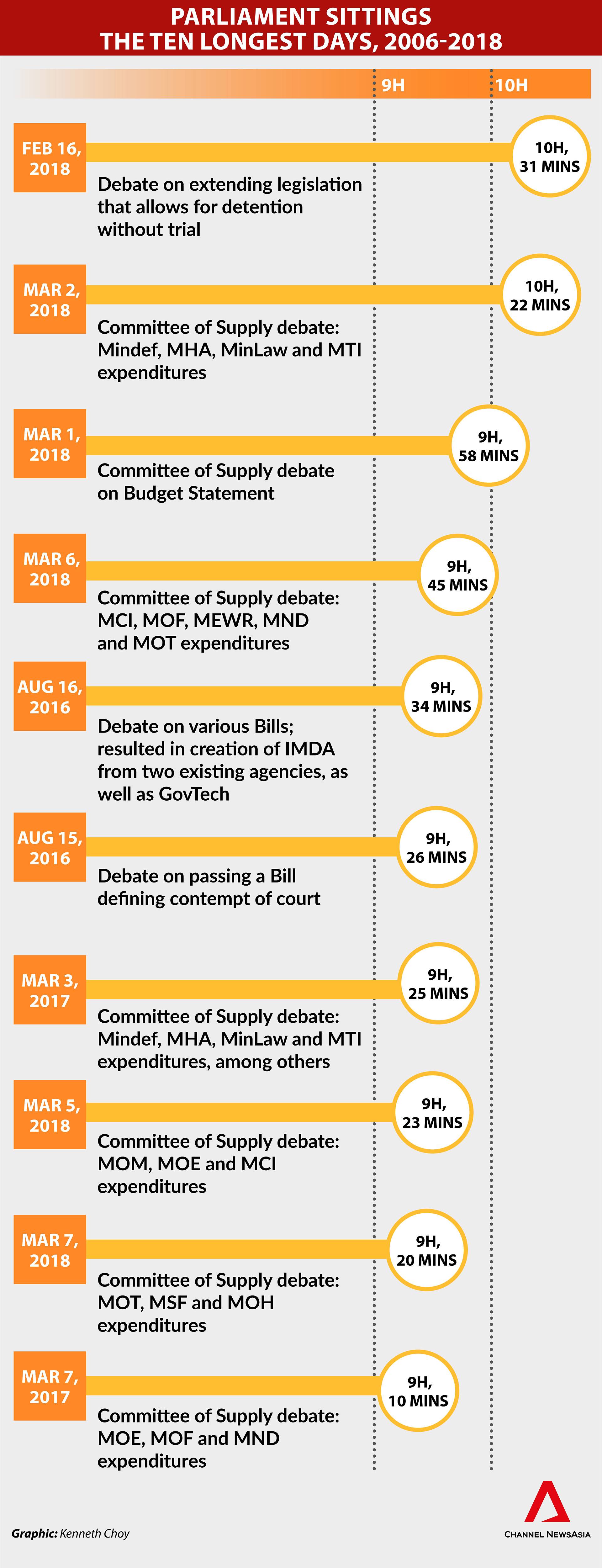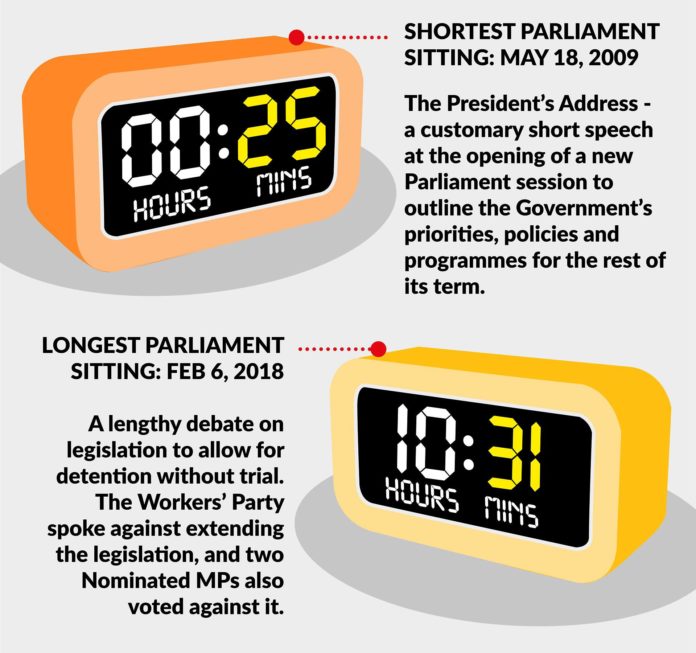SINGAPORE: A Member of Parliament’s life revolves around two key places: Their constituencies, walking the ground, holding Meet-the-People Sessions and spending time with residents; and in Parliament, where they undertake their role as legislators and seeing to the national interest when Parliament sits.
And in recent years, Parliamentary sittings appear to be getting longer.
“In the old days, we used to sit from 1.30pm to 7pm,” said MP for Chua Chu Kang GRC Zaqy Mohamad, who became an MP in 2006. “But now, it can start at 10am, and run to 7.30pm or 8pm.”
“There’ve been a few times when a 1-2 day sitting became 4 or 5 days because there were a lot of topics, or something controversial came up,” he added. “That caused a lot of commitment clashes.”
CRUNCHING THE NUMBERS
Indeed, data on the Parliament website bear out Mr Zaqy’s observations.
Each sitting usually begins at 1.30pm, but some have started as early as 10am.
Attendance is compulsory, and MPs will have to seek permission from the Speaker of Parliament if they wish to be absent from a sitting.
The letter of the law as set out in the Constitution of Singapore is clear: If an MP is absent for 2 consecutive months from Parliament sittings or any committee of Parliament to which he or she has been appointed without getting permission from the Speaker, the MP’s seat will become vacant.
Channel NewsAsia tabulated the numbers from Jan 2006 to Mar 2018, and found that Parliament sat for an average of 28.45 days each year between 2006 to 2017. While there was no discernible increase in the number of days Parliament has sat, the total length of time in terms of hours has gone up.
Election years such as 2006, 2011 and 2015 saw shorter hours due to the dissolution of Parliament, which precedes each General Election. Parliament also sometimes takes a mid-term break lasting about a month, known as a prorogue, before beginning its second session. The latest prorogue ended on Monday (May 7) with the opening of the second session of the 13th Parliament.
According to the data, the longest sitting happened on Feb 6 this year, where Parliament sat for 10 hours and 31 minutes. The marathon sitting was due to a lengthy debate on the Criminal Law (Temporary Provisions) Act, which allows for detention without trial. During the debate, the Workers’ Party spoke out against extending the legislation, which also saw two Nominated MPs vote “no”.
The shortest sitting was on May 18, 2009, which lasted 25 minutes. The session marked the opening of the second session of the Eleventh Parliament, during which then-President S R Nathan outlined the Government’s priorities, policies and programmes for the rest of the term. President Halimah Yacob also did so on May 7 – and she spoke for a similar length of time.

Sittings have also tended to be longer this year. Over the 12-odd years of data examined, there were 10 days that saw sittings that lasted nine hours or longer. Six of those 10 days happened this year.
Sittings are also typically longer during the yearly Budget and Committee of Supply debates, which is the extended period of parliamentary debate that follows the Budget speech early in the year. During this period, Parliament will sit for about ten days to debate the speech, and for each ministry to later present its expenditure plans for the new financial year.
According to the data, seven of the ten longest days in Parliament have occurred during the Committee of Supply debates. And five of them occurred this year: A round-up speech delivered by Leader of the House Grace Fu in Parliament highlighted that MPs had filed a total of 530 cuts, which lasted 3,120 minutes or about 52 hours, during this year’s Committee of Supply debates.

There were also drawn-out debates during sittings outside of the Committee of Supply debate. For instance, a bill on what constitutes contempt of court was passed in Parliament on Aug 15, 2016. It was passed only after a lengthy debate between Law Minister K Shanmugam and MPs from the Workers’ Party.
HOW DO THEY COPE?
But having Parliament sit for longer may not be a bad thing. For one, as Mr Zaqy explained, the longer sittings could be a result of more robust debate in the House.
“You have more MPs speaking up and more people putting questions through, which ultimately means having a lot more people making speeches,” he said. “So I guess that’s why we’re seeing much longer sittings now.”
“The other interesting thing is that there are also a lot more adjournment motions now,” he added. “This adds on to the sitting times as well.”
“Parliament has had to grapple with a range of complex issues and bills relating to public order, corporate governance and cyber security, as well as phenomena such as fake news,” added Nominated MP Mahdev Mohan, who is an Assistant Professor of Law at the Singapore Management University.
“It’s important that these matters which impact all Singaporeans are debated vigorously.”
How then, do MPs cope, particularly those who hold full-time jobs?
Mr Zaqy, who was a partner at accounting firm Ernst & Young at the time of his interview with Channel NewsAsia, admits that it can be difficult. He has since left the firm to take on a political appointment as Minister of State for National Development and Manpower.
“There’s no dispensation on my targets and KPIs, so despite having fewer hours than usual to work, you still have to perform to your role,” he explained. “You just have to be efficient and ensure that your targets are met.”
“In my previous firm, I used to take leave for Parliament sittings, and it could go all the way to a negative balance,” he added. “It becomes no-pay leave after that.”
“Now, I still take annual leave when there are important meetings I have to miss, or if I have to go overseas on Parliament business. But otherwise, they just benchmark me on my targets.”
MP for Nee Soon GRC Lee Bee Wah considers herself fortunate that unlike some of her fellow MPs, she does not have to take annual leave to be present for Parliament sittings.
“Before I merged my company, I got the understanding from the chairman that I don’t need to apply for leave for MP work,” she said. Dr Lee, who is a professional engineer, used to run her own engineering firm that she eventually merged with a bigger firm, Meinhardt. She now holds the position of Group Director at Meinhardt Singapore.
“This was one of the conditions before I let my company go,” she said.
But she did have to take a pay cut in the process.
“I’m receiving about a third of what I should be getting, because I told them I could only afford to spend a third of my time for the company,” she explained.
“It’s a sacrifice I had to make.”
Unlike MPs, Nominated MPs (NMPs) do not have to attend daily or weekly to their constituents’ concerns. But they face similar issues.
Apart from being an NMP, Ms K Thanaletchimi is a senior assistant manager in the healthcare industry, a member of the NTUC Central Committee and the President of the Healthcare Services Employees’ Union. She is also a member of several tripartite committees.
Despite not having a constituency to take care of, unlike her MP colleagues, Ms Thanaletchimi said she spends a lot of time conducting extensive dialogue sessions with union members in the healthcare sector. She added that getting material resources to draft her speeches “do take some time”.
As a result, she said, she works regularly from home on weekends and does late nights on weekdays to make up for the lost time.
But still, there have been clashes. She recalled an incident which she described as a time when she was “emotionally bankrupt”: When her mother was hospitalised for an urgent heart operation.
“That was the very fateful day when I had a Parliament sitting, and had to rush down to speak on the Bill which I had already prepared for,” she said.
‘LIKE HAVING TWO FULL-TIME JOBS’
Sleep and social gatherings are other things the MPs have to forego – not just to attend and prepare for Parliament sittings, but to see to their day-to-day work as an MP.
“Most times, I just work through the night,” said Mr Zaqy, who says he averages about 4-5 hours of sleep a night during peak periods. “Say you have a Meet-the-People session on Monday night and there’s a Parliament sitting on Tuesday. So you end up going home late on Monday, and it’s 3-4am before you can submit your speeches for the next day.”
“I also honestly can’t remember the last time I had a social gathering,” he added. “I’ve lost contact with a lot of my friends, unless they’re in the same industry.”
“It’s really like having two full-time jobs.”
The same point was made by Dr Lee, who noted that she spends about 50 hours a week on MP-related duties.
“The moment I decided to enter politics, I was very clear in my mind that my first priority is to serve my residents,” she said. “Unfortunately this meant that I have to sacrifice my family time.”
While she makes it a point to be around on special days like her children’s birthdays or wedding anniversary, she added that she is at Nee Soon almost every other day. “They’ve been very supportive, and I think they understand,” she said.
So why, then, do they do it?
Asst Prof Mohan pointed out that being a non-partisan voice in Parliament for sectors and Singaporeans he believes deserve to be heard is a “privilege”. This is a sentiment, he said, that is also shared by the rest of his NMP colleagues.
“When those voices contribute to law and policy through impassioned debate, or a constructive behind-the-scenes dialogue session with policy makers, our efforts are vindicated,” he said.
For Dr Lee, the reason is simple.
“I benefitted from our system, and I feel that this a very good opportunity for me to give back and make a difference in people’s lives,” she said.
“Other people have helped me, so now it’s time that I help other people.”





